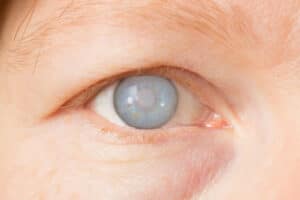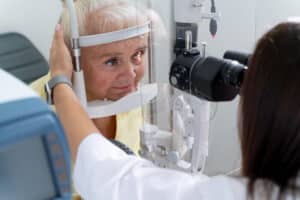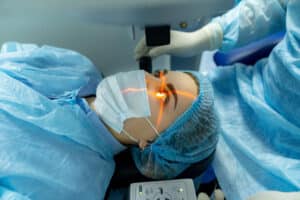Cataract treatment in the UK is a frequently performed surgical intervention in the field of ophthalmology. It stands as a reliable and effective solution for individuals grappling with the burdensome presence of cataracts, a condition characterised by the opaqueness of the eye’s natural lens, leading to a substantial impairment of vision. The availability of private cataract treatment in the UK presents a multitude of advantageous aspects, which in turn allure a significant influx of patients.
What Are Cataracts?
Cataracts present themselves as an ocular condition characterised by the clouding of the lens within the eye, resulting in a detrimental impact on one’s vision. The lens, a small and transparent disc nestled within the eye, typically maintains its clarity. However, the presence of cataracts causes a significant obstruction in visual perception.
Over time, these opaque formations gradually expand, ultimately leading to a complete loss of sight. Although cataracts generally affect both eyes, it is plausible for them to develop in only one eye or exhibit a higher prevalence in one eye compared to the other. The origins of cataracts can be attributed to the disintegration of lens tissues, resulting in the formation of protein clusters that obscure specific areas of the lens.
What Are The Symptoms of Cataracts?
As people grow older, cataracts frequently emerge as a common problem, leading to a gradual deterioration in visual clarity. The onset and progression of this condition give rise to a range of symptoms that individuals may encounter, encompassing:
- Reduced clarity in perceiving objects.
- Dullness in the perception of colours.
- Difficulties while driving, particularly at night.
- Heightened sensitivity to bright lights and glare.
- The progressive deterioration of visual quality.
- Vision becoming hazy or cloudy.
- diminished ability to perceive colours vividly.
- Frequent changes are required in spectacle prescriptions.

As a result, patients can anticipate remarkably favourable results from their cataract treatment in the UK with the utmost confidence.
Who is at Risk of Cataracts?
While cataracts have the potential to impact people across all age groups, they primarily present themselves as an ocular ailment linked to the natural process of aging. This condition tends to worsen gradually over time and may even demonstrate hereditary tendencies.
The precise causes behind the increased vulnerability to cataracts in older individuals still elude researchers, leaving room for ongoing speculation. Some hypotheses suggest that the lens in our eyes thickens, loses its transparency, and becomes less flexible as we age. Nevertheless, certain factors have been identified that could potentially heighten the likelihood of cataract development. These encompass a range of elements:
- diabetes
- a family history of cataracts
- smoking
- eye injury or trauma (such as eye surgery)
- medications (such as long-term use of steroids)
- regularly drinking excessive amounts of alcohol
- eye conditions (such as glaucoma)
How Do We Evaluate Cataracts?
Thorough Eye Evaluation For Cataract Treatment in The UK
In order to obtain a precise diagnosis of cataracts, it is absolutely imperative to conduct a comprehensive examination of the eyes. This crucial assessment is typically performed by highly qualified experts in the field, such as consultant ophthalmic surgeons or optometrists, who possess a wealth of experience and knowledge in this area.
These proficient professionals employ a variety of tests and evaluations to determine the existence and severity of cataracts, while also assessing the suitability of cataract treatment in the UK as a potential surgery option.
Evaluation of Visual Acuity
To assess your vision, a conventional eye chart is utilised to determine your ability to identify objects at varying distances. If your visual clarity falls below a certain standard, it could indicate the possible presence of cataracts.
Examination Using a Slit-Lamp
A specialised optical instrument known as a slit lamp is employed to effectively illuminate and magnify the intricate internal structures of the eye. By utilising intense light, the examiner can directly observe the lens and identify even the most subtle signs of opacities, often associated with cataracts.
Dilated Eye Examination
In a dilated eye examination, eye drops are administered to widen and enhance the size of your pupils. This enables the examiner to conduct a more precise assessment of the lens and identify any indications of cataracts. After diagnosing cataracts, healthcare professionals will engage in a comprehensive discussion with the patient regarding suitable treatment options.
The severity of cataracts and their impact on the individual’s quality of life will be carefully evaluated. In many instances, this evaluation may lead to a recommendation for cataract surgery, and appropriate arrangements for referral will be made.
Cataract treatment in the UK with The Medical Eye Clinic?
Currently, medical research has not discovered any breakthroughs in the field of treating or preventing cataracts. However, there is an effective solution available: the replacement of the hazy, natural lens with an artificial intraocular lens. By opting for this procedure, not only can your vision be significantly improved, but your overall quality of life can also be enhanced.
Cataract treatment in the UK is widely recognised as a globally practiced, safe, and highly successful surgical intervention. During the surgery, the cloudy natural lens is skilfully removed, and a small incision is made at the edge of the eye to accommodate the placement of the artificial intraocular lens. Remarkably, this incision typically heals itself, eliminating the need for any sutures and ensuring a swift and hassle-free recovery.
The entire procedure is usually completed within a short timeframe of 15 to 30 minutes, and thanks to the administration of anaesthesia, patients experience no discomfort throughout the process.
A Straightforward Procedure For Clearer Vision
Cataract extraction surgery is a commonly practiced and straightforward procedure used to remove the cloudy lens of the eye and treat cataracts. During this surgical procedure, a state-of-the-art artificial lens implant, called an intraocular lens, is delicately inserted into the eye, replacing the original lens. The results of cataract surgery often become evident immediately and can even improve visual clarity in certain cases.
Intraocular Lenses are Used For Cataract Treatment in The UK
In the field of cataract treatment in the United Kingdom, an extraordinary breakthrough has emerged known as the intraocular lens (IOL). This ground-breaking innovation is an artificial lens delicately implanted into the eye, flawlessly imitating the natural lens. Crafted from transparent and biocompatible materials, the IOL performs its function with exceptional efficacy.
The primary aim of the IOL is to expertly focus light onto the retina, providing unmatched visual clarity. Gone are the days of the laborious routine of constantly removing, cleaning, and replacing contact lenses. The IOL becomes a permanent fixture within the eye, eliminating the need for any demanding maintenance.
It is worth mentioning that the IOL is available in various types, each specifically designed to address different levels of vision correction. These options include monofocal, multifocal, and accommodating lenses. The selection of a particular IOL depends on numerous factors, such as the patient’s lifestyle, visual goals, and overall ocular health.
Benefits of Private Cataract Treatment in The UK
Enhanced Treatment Availability
Private cataract treatment in the UK offers a distinct advantage compared to the waiting list of the National Health Service (NHS) by providing swift access to necessary treatment. The patients of the NHS frequently face extensive waiting periods, enduring around six months or even longer before their surgery can be scheduled. In sharp contrast, our esteemed cataract eye surgery services, exclusively available in Devon, guarantee that patients receive prompt and timely treatment merely a few weeks after their initial consultation.
The Significance of Prompt Access to Cataract Treatment in The UK
The immediate availability of private cataract treatment in the UK holds tremendous importance for a multitude of reasons. Above all, swift access to treatment plays a crucial role in minimising the waiting period, which can lead to a further decline in a patient’s eyesight, potentially impacting their overall quality of life. Everyday activities like reading, driving, and even recognising familiar faces can become increasingly arduous, causing frustration, dependence on others, and a diminished sense of personal independence.
Additionally, untreated cataracts can sometimes give rise to other eye-related complications, including persistent inflammation, glaucoma, and, in severe cases, complete loss of vision. Hence, the sooner patients can avail themselves of treatment, the lower the likelihood of complications and the faster the restoration of their normal visual abilities. Furthermore, expedited access to cataract treatment in the UK also alleviates the anxiety and stress associated with waiting for a medical procedure, ultimately contributing to an overall improvement in mental well-being.
To embark on your journey towards private cataract treatment in the UK, we highly encourage you to reach out to our dedicated team today. You have the option to either call our team at 01392 829436 or use our convenient online contact form.




